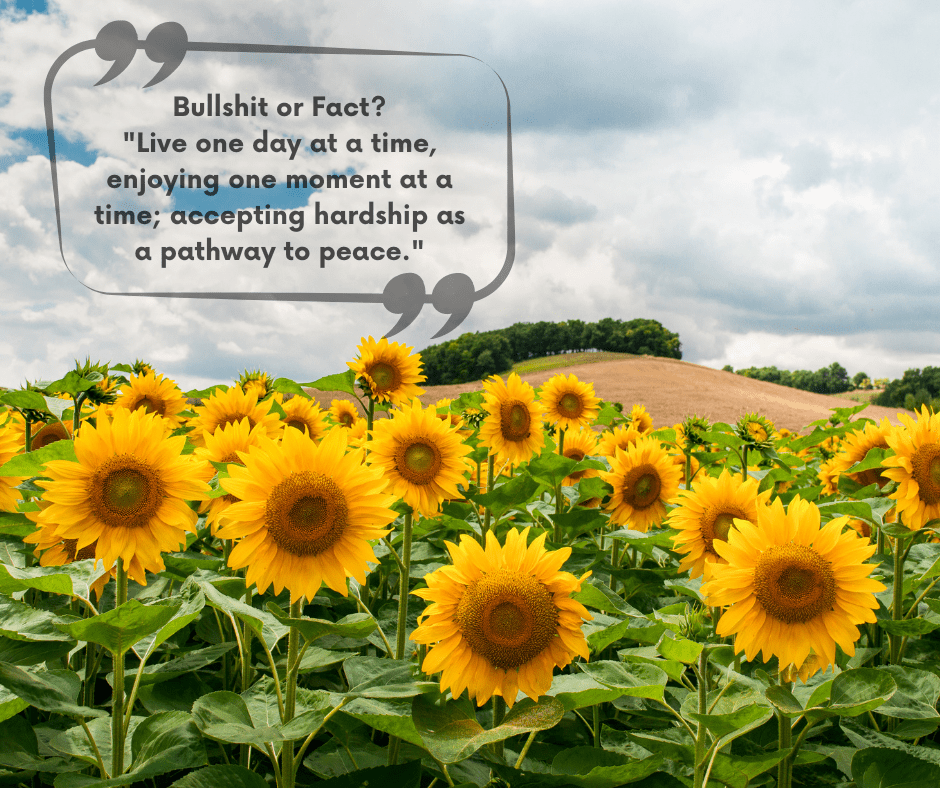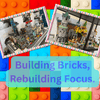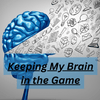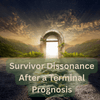Bullshit or Fact? "Live one day at a time, enjoying one moment at a time; accepting hardship as a pathway to peace.

Bullshit or Fact? "Live one day at a time, enjoying one moment at a time; accepting hardship as a pathway to peace.
Bullshit or Fact? "Live one day at a time, enjoying one moment at a time; accepting hardship as a pathway to peace."
Just five days ago, I was teetering on the brink of despair, drowning in a whirlpool of emotions ranging from frustration to anger. And let me be clear, those feelings have not magically vanished. Yet, I have been mulling over the wisdom of the serenity prayer, especially the part that urges us to "live one day at a time, enjoying one moment at a time; accepting hardship as a pathway to peace." In a world where advice like "eat less and you will not get fat" or "do not use credit cards and you will not have debt" is readily dispensed, does anyone truly listen, or are we all just nodding along, hoping for an easy fix?
So, in the chaotic cacophony of my mind, I could not help but wonder: is this bullshit or fact? And how do we incorporate this into our daily routine?
When Positivity Feels Like a Lie
Usually, I ignore this type of positive attitude as empty words meant for those who are unable to handle life's difficulties. Perhaps they are incapable of dealing with life's challenges without collapsing under the weight of it all. However, my experience has been different. Between occasional distractions like watching a good movie, getting lost in music, or spending time with loved ones—even my furry friend—I catch brief glimpses of what it feels like to be carefree. Unfortunately, those moments are quickly replaced by a stern reminder from my own mind: "You still have brain cancer, remember?"
So, how do I go back to that prayer? How do I learn to take one day at a time and accept hardship as a pathway to peace? What does that even mean in practical terms?
The Serenity Prayer: Platitude or Practical Tool?
As someone who typically brushes off positive attitudes as hollow platitudes, grappling with the idea of embracing the serenity prayer has been a journey in itself. How do I reconcile the notion of living one day at a time and accepting hardship as a pathway to peace with the harsh reality of my situation? What does it truly mean to find the calm and comfort in the midst of uncertainty and pain?
These questions have become my companions on this tumultuous path. Yet, as I navigate through the ups and downs of my journey, I am beginning to understand that perhaps there is wisdom in these words after all. Maybe, just maybe, by allowing myself to acknowledge the small victories, the fleeting moments of joy, and by documenting my experiences along the way, I am gradually finding my own pathway to peace amidst the chaos.
Writing as a Way Forward
My mindset seems to shift like the wind, making this journey feel like a rollercoaster of emotions. Yet, amidst the twists and turns, I have found peace in embracing the notion of taking things one day at a time and meticulously documenting my experiences. Writing has become my sanctuary, a means to navigate through the chaos and find a glimmer of peace in the storm.
Through this process, I have come to appreciate that the act of slowing down—even if only to write—forces me to reflect, breathe, and feel. These are small victories. Moments where I am no longer consumed by fear or grief, but grounded in the present.
Making the Phrase Practical
Living one day at a time does not mean ignoring the future. It means not letting the unknown paralyze you. It means focusing your energy on what you can do right now. That could be drinking water. Answering one email. Taking a nap. Calling someone you love. It sounds simple, but it is powerful.
This approach has helped me during moments of medical uncertainty. Instead of planning every possible outcome of my next MRI, I ask: how do I want to spend today? What can I control? That reframing changes everything. It gives me back some agency, and a sense of self amid so much out of my hands.
Observing the Small Joys
There are moments I never noticed before all this. The way my dog sighs when he's finally comfortable. The morning light filtering through my curtains. A random text from a friend. These little things suddenly feel sacred. When you are sick, the big stuff falls away and the details—what others may call ordinary—become the anchors that get you through.
And those details are often the only things I can look forward to. Some days I build my whole routine around something tiny and enjoyable—a certain song, a warm bath, a familiar meal. That does not mean I am ignoring the hard stuff. It means I am making room for something other than fear.
Learning to Pause
Our world glorifies being busy, having plans, hustling. But illness taught me the importance of stillness. Of pausing long enough to hear my own thoughts and not be afraid of them. Meditation helps, but even more than that, giving myself permission to do nothing sometimes is transformative.
I used to feel guilty for laying down. Now I see it as survival. If resting is what lets me get through another day, then that day is a success. Pausing does not mean giving up—it means pacing myself for a marathon I did not choose to run but must finish.
Final Thoughts
So, is it bullshit or fact? I think it depends on how we live it. For me, the serenity prayer is beginning to feel more like a map than a myth. A compass pointing me toward something steadier, even if I never fully arrive.
We do not always get to choose the storms. But we can learn to ride the waves with a little more grace. And if that means taking things one day at a time, I am all in. Because sometimes surviving today is more than enough.
Helpful Resources
Tags: One Day at a Time, Serenity Prayer, Brain Cancer Journey, Mindfulness, Emotional Health, Writing for Healing, JohnVsGBM, Accepting Hardship, Personal Reflection, Coping with Illness
Disclaimer: This blog reflects personal experiences and is not medical advice. If you are experiencing emotional distress or suicidal thoughts, please contact a mental health professional. In the U.S., you can call or text 988 for free, confidential support. You are not alone.


 NEW ARRIVALS
NEW ARRIVALS APPAREL
APPAREL GIFT AND HOME
GIFT AND HOME COLLECTION'S
COLLECTION'S HOPE HUB
HOPE HUB BLOG
BLOG



